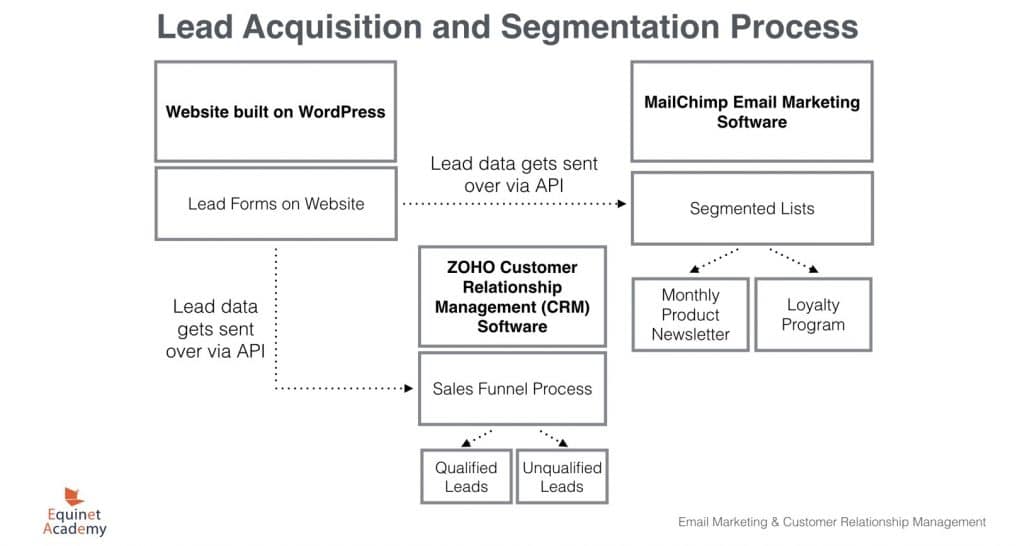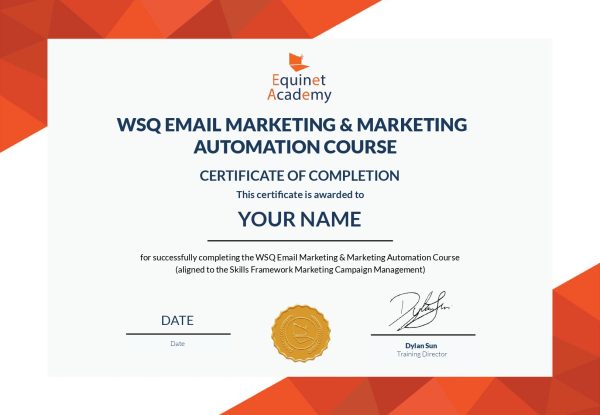Create High-Impact Email Campaigns with Marketing Automation
Course Description
Email marketing has been around for a long time. Despite the rise of social media platforms like TikTok and Instagram, it remains one of the most effective tools in a marketer’s toolkit. In fact, for every $1 spent, email marketing generates an average return of $38 (ROI).
In this 2-day hands-on course on Email Marketing & Marketing Automation, participants will uncover powerful strategies for designing, executing, and optimising both manual and automated email campaigns. They will gain a strong understanding of email marketing automation platforms and learn how to streamline customer lifecycle communication to drive engagement and revenue.
Through a blend of strategy, content planning, and technical setup, participants will learn to set up lead generation and nurturing campaigns from the ground up. The course will also explore key automation techniques such as trigger-based flows, drip campaigns, lead scoring, and dynamic content personalisation.
Hands-on practice with leading tools like Mailchimp will give participants real-world experience in building, automating, and analysing email campaigns that convert.

Lead Acquisition and Segmentation Process
Target Audience
Marketing Executives, Marketing Managers, CRM Specialists, Content Strategists, and individuals who wish to:
- Understand how email marketing and marketing automation can be integrated into broader marketing strategies to achieve business objectives
- Develop, automate, and optimise email campaigns to boost sales, increase customer engagement, and nurture relationships throughout the customer lifecycle
Course Highlights
In this email marketing and marketing automation course, participants will learn:
- How to set up and launch email marketing campaigns from ground zero
- How to tailor and deliver customised marketing communications based on customer lifecycle stages to achieve marketing objectives
- How to perform strategic email list and contact database segmentation for better targeting and engagement
- How to measure and optimise campaign performance using essential email marketing metrics
- How to design and implement lead generation, lead nurturing, and lifecycle strategies that align with business goals
- How to build automated lifecycle workflows using behaviour-based triggers and dynamic content
- How to implement a variety of automated campaigns such as welcome sequences, abandoned cart reminders, re-engagement flows, and promotional drips
- How to integrate CRM data and marketing automation tools (e.g. Mailchimp) to enable lead scoring, sales enablement, and highly personalised user journeys
Course Objectives
By the end of the course, participants will be able to:
- Develop and implement an effective email marketing strategy, incorporating both manual and automated communications
- Establish email marketing campaign objectives and performance metrics to measure the effectiveness of email marketing implementation and automation sequences
- Define customer personas and perform segmentation of contact database and email lists for more relevant targeting and personalisation of products and services
- Source, evaluate, and select the most appropriate email marketing and marketing automation platform for the business
- Integrate social media marketing efforts with email marketing campaigns for a seamless omnichannel experience
- Demonstrate an understanding of lifecycle marketing in order to communicate relevant email marketing messages at appropriate intervals using automation
- Drive email marketing campaign development and implementation that leverage both email marketing automation and CRM tools in alignment with marketing strategy
- Build automated workflows including trigger-based and drip email campaigns that align with user behaviour and funnel stages
- Implement lead scoring models to prioritise and personalise customer journeys using automation platform such as Mailchimp
- Identify important email marketing metrics (e.g., open rates, click-through rates, bounce rates, unsubscribe rates) to track and analyse in order to achieve objectives
- Evaluate email marketing and automation performance metrics and recommend improvements to strategy and action plans based on data-driven insights
- Ensure compliance with regulations like PDPA and GDPR throughout automated customer journey workflows
Certification
A SkillsFuture WSQ Statement of Attainment (SOA) – Marketing Campaign Management under the Skills Framework TSC and Certification of Completion by Equinet Academy will be awarded to candidates who have demonstrated competency in the WSQ Email Marketing & Marketing Automation course assessment and achieved at least 75% attendance.

*This course is accredited by SkillsFuture Singapore under the WSQ Skills Framework Marketing Campaign Management
Course Code: TGS-2022013776
Course Support Period: 24 May 2022 – 23 May 2026
Course Outline
Introduction to Email Marketing, Marketing Automation and Customer Relationship Management
- What is Email Marketing and why is it important?
- What is Marketing Automation and its importance?
- What is Customer Relationship Management?
- The Power of Email Marketing and its role in a digital marketing strategy
- Inbound vs outbound email marketing and why you should focus on inbound methods
- How email marketing, automation, and CRM systems complement each other in a unified customer journey
Define Email Marketing Customer Personas and Campaign Objectives
- What is lifecycle marketing and why is it important?
- Understanding customer lifecycle marketing in relation to email marketing
- Types of lifecycle emails with examples
- Define email marketing campaign objectives
- Define customer personas for email marketing and how to map them to marketing automation journeys
Fundamental Principles of Email Marketing Segmentation and Personalisation
- What is an email list?
- Why are contact databases and email lists important?
- Contact database management and segmentation strategy
- 5 Ws of Segmentation (Who, what, when, where, why)
- Segmentation of implicit and explicit data
- Person-related (B2C) vs company-related (B2B) segmentation
- Segmentation targeting based on channel preference – E.g. Direct mail, social media, SMS, mobile, Apps, etc.
- What a good segmentation strategy looks like (real-world examples)
- How marketing automation platforms can personalise emails at scale based on segmentation
Choosing a Reliable Email Marketing Software Provider
- Email Marketing Vs Marketing Automation Vs CRM software
- Understanding the current CRM, email marketing, and marketing automation platforms
- Navigating the common features of CRM, email marketing, and marketing automation tools
- How to source and choose the right platform based on business requirements, automation needs, and integration capabilities
Email Marketing Lead Generation and Customer Data Acquisition
- Identifying and acquiring sales and marketing data
- Collecting data through Pop-ups, Squeeze/Landing Pages, and CTAs
- Accelerating signups with lead magnets
- Types and examples of lead magnets
- Thank You page best practices
- Welcome emails and next steps in automated onboarding
- PDPA and GDPR guidelines for ethical data capture and automation compliance
Email Marketing Campaign Implementation: Lead Scoring, Advanced Segmentation, and Lead Nurturing
- What is lead scoring and how does it enhance automation?
- Best practices in lead scoring
- Creating and integrating lead scoring models into your automation platform
- Leveraging email marketing, automation, and CRM to streamline sales
- Creating and managing a sales pipeline using automated email flows
- Triggered email sequences and dynamic workflows
- Monitoring customer health and enabling timely, relevant touchpoints
- What is lead nurturing?
- Strategies for nurturing leads through automated content journeys
- Types of nurturing emails: Welcome, Trust-Building, Transactional, Promotional, Progressive Profiling, Goodbye emails
- Hands-on: Creating your first email campaign in ActiveCampaign (or similar)
- Writing effective subject lines using automation-tested formats
- Best practices for email copy, layout, images, and mobile-first design
- Pre-send checklist and email testing
- Email sending best practices
- Integrating social media signals and retargeting triggers into your email automation strategy
Email Marketing Automation
- How to improve email engagement by automating and optimising lifecycle workflows based on user behaviour
- Understanding behavioural triggers (e.g., email opens, link clicks, page visits)
- Designing and deploying drip campaigns, trigger-based flows, and re-engagement journeys
- Personalising user experiences through automation and dynamic content
Using automation to align marketing and sales through lead handoff and CRM integration - How to set up automation in Mailchimp
Email Marketing Analytics and Optimisation
- Essential metrics every marketer should track and optimise (Open Rate, Click-Through Rate, Conversion Rate, List Growth/Decline, Unsubscribes, ROI)
- Understanding how automation data differs from one-off campaigns
- Integrating automation campaign tracking with Google Analytics
- Deliverability best practices and tools to monitor sender reputation
- Framework for analysis and optimisation of automated and manual campaign
- Summary and recap
Trainer
*Only one trainer will be facilitating per class.

Jethro Xu is the Founder of JET.AVE, Agency Head at Metric Digital, and fractional Chief Marketing Officer at several startups. With close to two decades of experience in marketing and eCommerce, Jethro has helped build and scale many eCommerce storefronts, both for himself and his clients. His eCommerce experience is varied, and ranges from consumer electronics and movie paraphernalia, to flowers and healthcare products, and everything in between! His portfolio of eCommerce clients also includes companies at every stage of business maturity, from startups with a single product, to established multinational brands trying to expand into new markets.

Razy Shah is the co-founder of 2Stallions Digital Marketing Agency- an award-winning full-service agency. He co-founded 2Stallions in 2012 and has since grown it from an initial team of two to a company of thirty. Razy has over a decade of experience spanning across corporate sectors such as digital marketing, business development and management.
*Only one trainer will be facilitating per class.
Course Fees & Fundings
Course Fee:
S$975.00 (inclusive of 9% GST)
Course Fee After Eligible SSG Subsidies:
From S$292.50 (inclusive of 9% GST) after SSG Subsidies
Check your eligible grant amount and nett payable course fees when you apply now.
SkillsFuture Mid-Career Enhanced Subsidy (MCES)
Eligible for Singapore Citizens, aged 40 years old and above
Nett course fee payable (including 9% GST): S$292.50
Course fees after subsidies can be further offset by SkillsFuture Credit and are also UTAP claimable.
SkillsFuture Baseline Funding
Eligible for 21 years old and above, and a
- Singaporean Citizen; or
- Permanent Resident; or
- Long Term Visitor Pass Plus (LTVP+) Holder
Nett course fee payable (including 9% GST): S$487.50
Course fees can be further offset by SkillsFuture Credit and are also UTAP claimable for Singapore Citizens aged 25 and above. Singapore Citizens aged 21 to 31 may also offset fees with the Post Secondary Education Account Funds.
SkillsFuture Enhanced Training Support for SMEs (ETSS)
Eligible for SME Company-Sponsored, 21 years old and above, and a
- Singapore Citizen; or
- Permanent Resident; or
- Long-Term Visitor Pass Plus (LTVP+) Holder
Nett course fee payable (including 9% GST): S$292.50
Course fees after subsidies can be further offset by Skillsfuture Enterprise Credit (SFEC)
SkillsFuture Baseline Funding
Eligible Non-SME Company-Sponsored, 21 years old and above, and a
- Singaporean Citizen; or
- Permanent Resident; or
- Long Term Visitor Pass Plus (LTVP+) Holder
Nett course fee payable (including 9% GST): S$487.50
Course fees after subsidies can be further offset by Skillsfuture Enterprise Credit (SFEC)
SkillsFuture Mid-Career Enhanced Subsidy (MCES)
Eligible for Non-SME Company-Sponsored, Singapore Citizens, aged 40 years old and above
Nett course fee payable (including 9% GST): S$292.50
Course fees after subsidies can be further offset by Skillsfuture Enterprise Credit (SFEC)
Course Schedule
| Learning Mode | Course Dates | Duration | Trainer |
|---|---|---|---|
| In-Person | 03, 04 Feb 2026 (Tue, Wed) | 9.00am - 6.00pm | |
| In-Person | 01, 02 Apr 2026 (Wed, Thu) | 9.00am - 6.00pm | |
| In-Person | 23, 24 May 2026 (Sat, Sun) | 9.00am - 6.00pm | |
| Online via Zoom | 02, 03 Jun 2026 (Tue, Wed) | 9.00am - 6.00pm | |
| In-Person | 30, 31 Jul 2026 (Thu, Fri) | 9.00am - 6.00pm | |
| In-Person | 19, 20 Sep 2026 (Sat, Sun) | 9.00am - 6.00pm | |
| In-Person | 01, 02 Oct 2026 (Thu, Fri) | 9.00am - 6.00pm | |
| In-Person | 01, 02 Dec 2026 (Tue, Wed) | 9.00am - 6.00pm |
Click on the course dates above to register online.
Frequently Asked Questions (FAQs)
Trainees should be proficient in web surfing and be able to write and converse in English.
For in-person training, do bring along a laptop. You also have the option to loan a laptop from us for the duration of the course. You may also want to bring along a jacket in case the room gets cold.
For online classes, do ensure you have a functional laptop and have Zoom installed prior to class.
As there will be WSQ assessments conducted in this course, you are required to bring along your NRIC or any form of photo identification for ID verification purposes.
Yes, you may contact your trainer after the course. There are other post-training support channels such as the Equinet Academy Insider Community where you may network with like-minded individuals and industry experts and live Ask Me Anything sessions where you may seek advice from a subject matter expert.





















